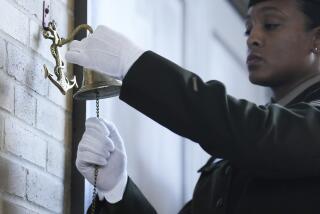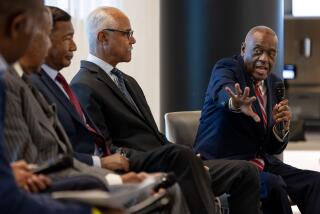CRENSHAW : Ex-Buffalo Soldiers Teach Forgotten Chapter of History
- Share via
The Buffalo Soldiers are a part of history that Charles Johnson has never read about in any textbook.
But last week, Johnson and 100 other students at Dorsey High School got a firsthand account of what it was like to belong to a black cavalry unit that served in a segregated U.S. Army.
“Most of the stuff they’re telling us we don’t really know,” said Johnson, a junior. “At first I thought the Buffalo Soldiers were from the Civil War, maybe, but I didn’t know much about them.”
Standing at attention during a two-hour assembly, former Buffalo Soldiers John Tull, Franklin Henderson and Frederick Jones shared their memories of serving in North Africa and Korea and of patrolling the Western states.
“A lot of people are finally recognizing the omission of many different cultures’ history,” said Henderson, president of the Buffalo Soldiers national association.
Created in 1866, the Buffalo Soldiers helped patrol the West on horseback. They later served in several other conflicts, including World War II. More recently, the men of the all-black cavalry unit were honored by the Armed Forces, and the Postal Service issued a stamp commemorating their service.
Tull, who joined the Buffalo Soldiers after graduating from college, said he was drawn to the military because of the lack of jobs for African Americans.
“I looked at all the guys who had gone to school with me, and they were carrying mailbags or working as janitors,” Tull, 75, told the students. “I said I would do better than that, and I joined the Army because my grandmother, who was a slave, said, ‘You’ve got to get into the cavalry.’ ”
The Army disbanded the Buffalo Soldiers--the Plains Indians had given them that name in honor of their fierce spirit--in 1944.
For Sabrina Jackson, 17, the oral histories proved to be a lesson she won’t soon forget.
“We (teen-agers) hear so much about slavery and the downfall of blacks rather than the positive side of what we’ve achieved,” Jackson said. “This is long overdue.”
Waving their hands in the air, students strained to ask questions that, for the ex-soldiers, evoked painful memories of loss, isolation and conflict.
James Berger, a history teacher at Dorsey, arranged for the veterans to visit the campus.
“What I’m trying to do is get students to talk to people--whether it be to their parents or their grandparents--about their history,” Berger said. “It’s important for students to have access to living historical figures.”
More to Read
Sign up for Essential California
The most important California stories and recommendations in your inbox every morning.
You may occasionally receive promotional content from the Los Angeles Times.













